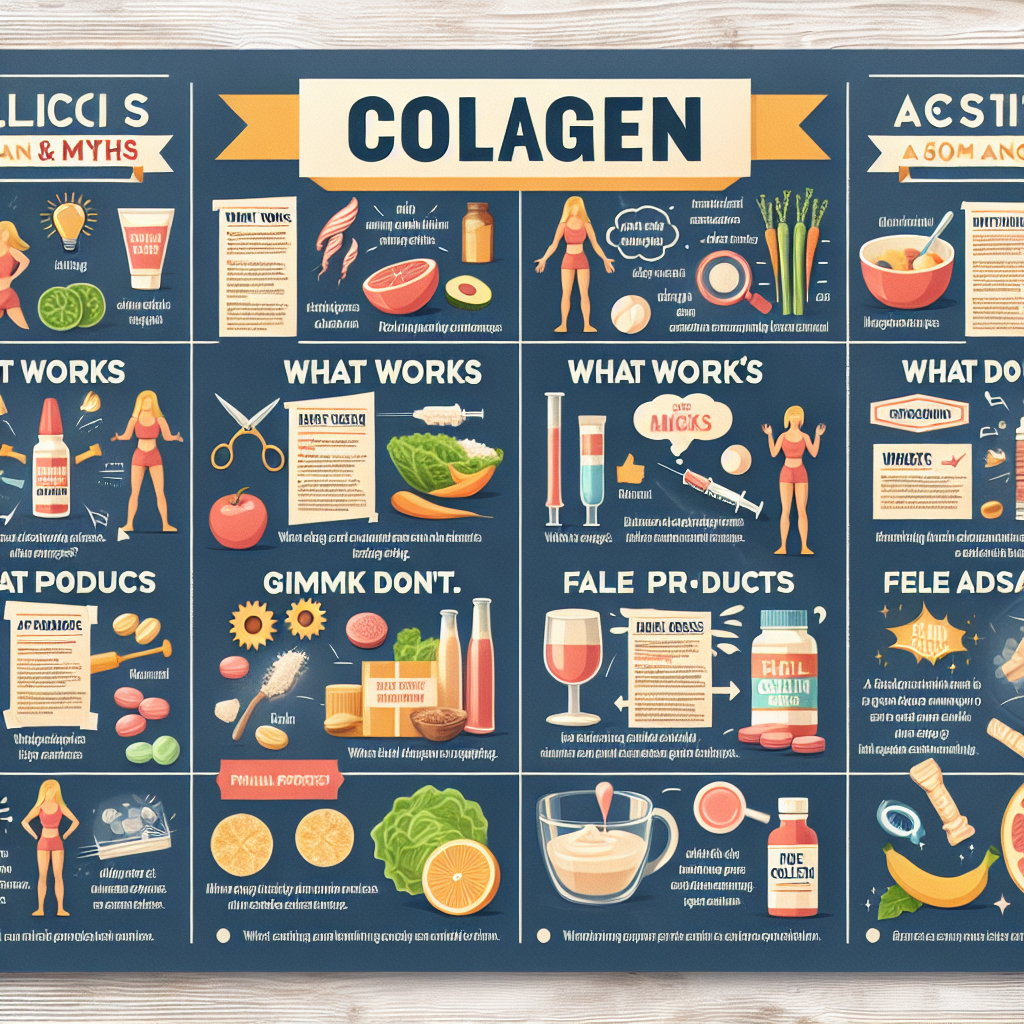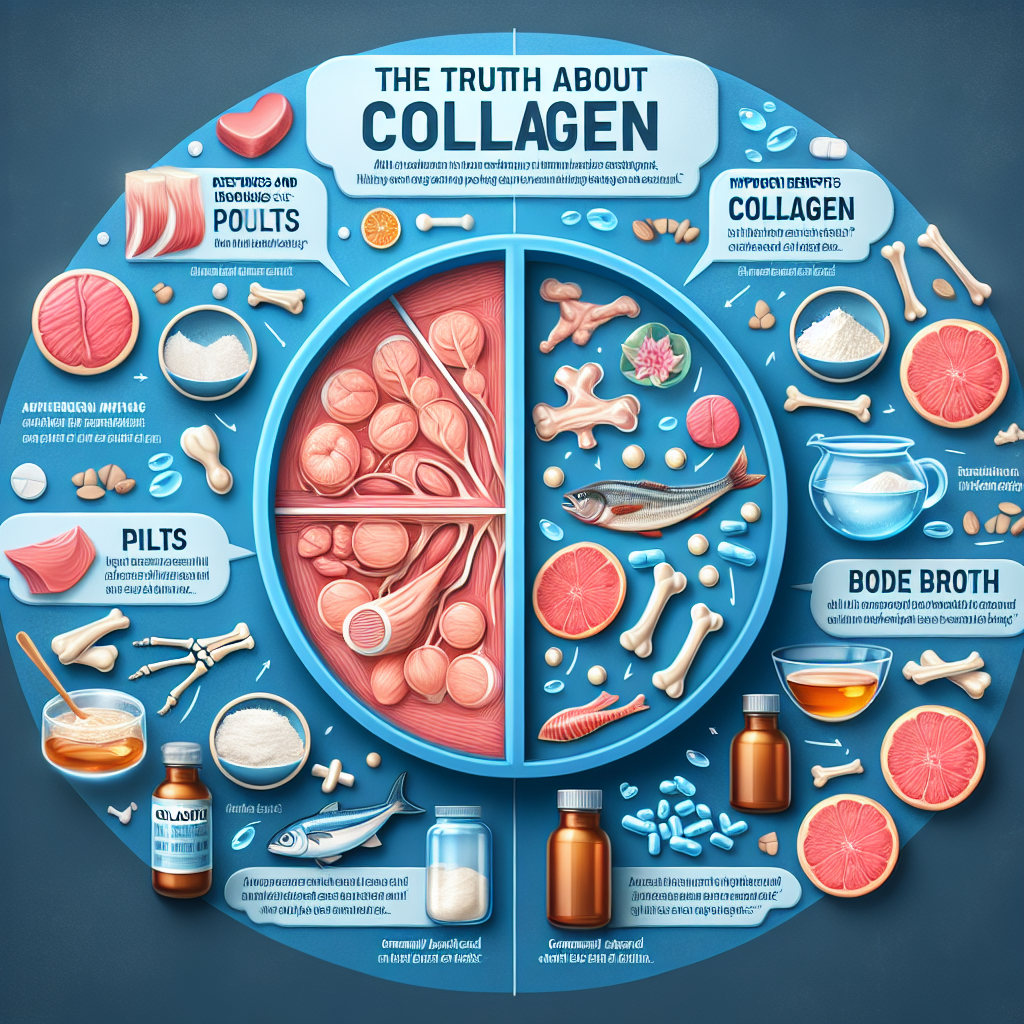The Truth About Collagen: What Works and What Doesn’t

Discover the truth about collagen: what works and what doesn’t. Uncover the facts and debunk the myths by clicking here.
Unveiling the Reality: Effective and Ineffective Collagen Treatments
Collagen, the most abundant protein in the human body, is a crucial component of our skin, hair, nails, bones, and joints. Its benefits are widely touted in the beauty and health industry, with a plethora of treatments and products promising to boost collagen levels and deliver youthful, glowing skin. However, not all collagen treatments are created equal. It’s essential to separate fact from fiction and understand what works and what doesn’t when it comes to collagen.
Firstly, let’s delve into the world of collagen supplements. These are typically derived from bovine or marine sources and are marketed as a convenient way to increase collagen levels. The truth is, while these supplements are generally safe to consume, their effectiveness is still a topic of debate among scientists. Some studies suggest that collagen supplements may improve skin elasticity and hydration, but the evidence is not yet robust enough to make definitive claims. Moreover, it’s important to remember that dietary supplements are not regulated as strictly as medications, so the quality and composition of these products can vary widely.
Next, we turn our attention to collagen creams and serums. These topical products often claim to penetrate the skin and replenish collagen levels. However, the reality is that collagen molecules are too large to be absorbed through the skin. Therefore, while these creams may provide temporary hydration and plumpness, they are unlikely to have a lasting impact on collagen levels in the skin.
In contrast, treatments that stimulate the body’s natural collagen production have shown more promising results. These include procedures like microneedling, laser therapy, and radiofrequency treatments. Microneedling, for instance, involves creating tiny punctures in the skin, which triggers the body’s wound healing response and stimulates collagen production. Similarly, laser therapy and radiofrequency treatments heat the skin’s deeper layers, promoting collagen synthesis. These treatments, performed by trained professionals, have been shown to improve skin texture and firmness over time.
Another effective way to boost collagen is through a balanced diet. Certain nutrients are known to support collagen production, including vitamin C, proline, glycine, and copper. Foods rich in these nutrients, such as citrus fruits, berries, eggs, meat, and shellfish, can help maintain healthy collagen levels. Additionally, avoiding excessive sun exposure and quitting smoking can prevent collagen breakdown, preserving the skin’s elasticity and youthful appearance.
Lastly, it’s worth mentioning that while collagen is often associated with beauty, its benefits extend beyond skin health. For instance, some research suggests that collagen supplements may help alleviate joint pain in people with osteoarthritis. Moreover, collagen plays a vital role in maintaining the integrity of our gut lining, potentially impacting digestive health.
In conclusion, when it comes to collagen treatments, it’s crucial to approach with a discerning eye. While collagen supplements and creams may offer some benefits, their effectiveness is not yet firmly established. On the other hand, treatments that stimulate natural collagen production and a collagen-supporting diet appear to be more promising strategies. As always, it’s advisable to consult with a healthcare professional before starting any new treatment or supplement regimen.
The Truth About Collagen: Distinguishing Between Proven Benefits and Myths

Collagen, a protein that is naturally produced in our bodies, has been the subject of much discussion and debate in recent years. It is hailed as a miracle worker for everything from skin health to joint pain, and it is increasingly being incorporated into a variety of health and beauty products. However, as with any trending health topic, it is essential to distinguish between proven benefits and myths.
Collagen is the most abundant protein in our bodies, making up about a third of our total protein content. It is a critical component of our skin, hair, nails, bones, and joints. As we age, our bodies produce less collagen, leading to common signs of aging such as wrinkles and joint pain. This natural decline has led many to turn to collagen supplements in hopes of replenishing their body’s supply.
One of the most well-documented benefits of collagen is its positive impact on skin health. Numerous studies have shown that taking collagen supplements can improve skin elasticity and hydration, reducing the appearance of wrinkles and other signs of aging. This is because collagen is a vital part of the skin’s structure, and supplementing with it can help to replenish the collagen that our bodies are no longer producing as efficiently.
Another proven benefit of collagen is its role in joint health. Collagen is a major component of our joints, and as our natural collagen production decreases with age, our joints can become less stable and more prone to injury. Research has shown that collagen supplements can help to reduce joint pain and improve joint function, particularly in individuals with osteoarthritis.
However, while these benefits are well-supported by scientific research, there are also many claims about collagen that are not as well-substantiated. For example, some proponents of collagen supplements claim that they can promote weight loss, improve gut health, and even boost mood. While these are intriguing possibilities, the current scientific evidence does not support these claims.
In terms of weight loss, while some studies have suggested that collagen supplements may help to increase feelings of fullness and thus potentially aid in weight loss, the evidence is not strong enough to make definitive claims. Similarly, while there is some preliminary evidence suggesting that collagen may have a positive impact on gut health, more research is needed to fully understand this relationship.
As for the claim that collagen can boost mood, this is largely based on the fact that collagen contains the amino acid glycine, which has been linked to improved sleep and mood. However, it is important to note that many other foods also contain glycine, and it is not clear whether the amounts found in collagen supplements are sufficient to have a significant impact on mood.
In conclusion, while collagen does have some proven benefits, particularly in terms of skin and joint health, many of the claims made about this protein are not yet supported by robust scientific evidence. As with any supplement, it is important to approach collagen with a critical eye and to consult with a healthcare professional before starting any new supplement regimen.
Collagen Supplements: What Delivers Results and What Falls Short
Collagen, the most abundant protein in the human body, is a crucial component of our skin, hair, nails, bones, and joints. Its benefits are widely touted, from promoting skin elasticity to providing strength to our bones and joints. As we age, our bodies naturally produce less collagen, leading to common signs of aging such as wrinkles, joint pain, and brittle nails. This has led to a surge in the popularity of collagen supplements, with many people turning to these products in hopes of slowing down or reversing the aging process. However, not all collagen supplements are created equal, and it’s important to understand what works and what doesn’t.
Collagen supplements come in various forms, including powders, capsules, and liquids. They are typically derived from bovine or marine sources and are hydrolyzed, meaning they are broken down into smaller molecules called peptides for easier absorption. The efficacy of these supplements largely depends on their bioavailability, or how well they are absorbed and utilized by the body.
Research suggests that hydrolyzed collagen supplements are indeed bioavailable and can increase levels of collagen in the skin, improve skin elasticity, and reduce wrinkles. A study published in the Journal of Medical Nutrition and Nutraceuticals found that participants who took a hydrolyzed collagen supplement showed significant improvement in skin elasticity and hydration after 12 weeks. Another study in the Journal of Cosmetic Dermatology reported that oral collagen peptide supplements could increase skin hydration by up to 28% after eight weeks.
However, it’s important to note that while these studies show promising results, they are often small and funded by supplement companies, which could potentially bias the results. More independent, large-scale studies are needed to confirm these findings.
Furthermore, not all collagen supplements deliver the promised results. For instance, collagen creams and lotions, which claim to boost collagen levels in the skin, often fall short. The reason is simple: collagen molecules are too large to penetrate the skin’s surface, so most of it just sits on top of the skin without providing any real benefits.
In addition, some collagen supplements may contain contaminants such as heavy metals, especially those derived from marine sources. Therefore, it’s crucial to choose supplements from reputable brands that have been independently tested for purity and potency.
Diet and lifestyle factors also play a significant role in collagen production. Consuming a diet rich in vitamin C, proline, and glycine – nutrients that are essential for collagen synthesis – can help boost your body’s natural collagen production. Similarly, avoiding excessive sun exposure and quitting smoking can help preserve your existing collagen levels.
In conclusion, while certain collagen supplements, particularly hydrolyzed ones, show promise in boosting collagen levels and improving skin health, not all deliver the results they promise. Collagen creams and lotions, for instance, are largely ineffective due to the inability of collagen molecules to penetrate the skin. It’s also important to consider the quality and purity of the supplements, as well as diet and lifestyle factors that influence collagen production. As always, it’s recommended to consult with a healthcare professional before starting any new supplement regimen.